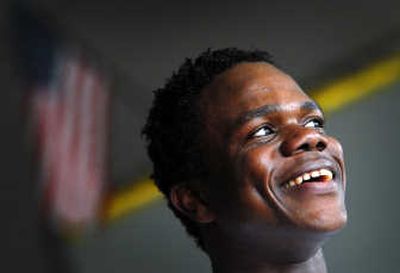Students overcome WASL setback to graduate

Ericson Weah threw up his hands and threatened to give up on the prospect of a high school diploma more than once this year.
The 18-year-old Central Valley High School senior and African refugee speaks French and three African dialects, but he couldn’t pass the WASL. Weah learned English just three years ago after fleeing war-torn Liberia.
He has made three attempts at the Washington Assessment of Student Learning, the state’s answer to the federal No Child Left Behind law. But because of language and cultural barriers, Weah failed. He didn’t understand the material.
“It was frustrating at times,” Weah said.
But CV officials helped him build a portfolio of work called a “collection of evidence,” one of several alternatives approved by the Legislature last year for students who struggle to pass the standardized test. He is among about 100 Central Valley district seniors who successfully completed a similar portfolio and are on track to graduate after multiple failed WASL attempts.
This is the first year passing scores on the reading and writing parts of the WASL are required for graduation.
And with as little as two weeks left until commencement for the Class of 2008, other school districts are looking to Central Valley for guidance as they scramble to assist students who still haven’t met WASL standards.
The portfolios take months to complete. They can include collections of essays to satisfy the reading and writing requirement, for example, and math worksheets showing students’ problem-solving skills.
“We’ve spent hours and hours and hours going over them,” said Evan Sorenson, a CV administrator.
Other area schools have not had CV’s success with the portfolios but are finding ways to help students.
Ferris High School submitted just 16 collections this year, and three students’ work was rejected by the state, said Kim Halcro, assistant principal.
Figures for Spokane Public Schools’ other high schools were unavailable.
East Valley High School offered an after-school class for about 30 struggling seniors. Some were able to show proficiency on the WASL by posting high enough scores on the SAT or ACT college preparation exams, another option. Some students had taken NCLB-approved tests in other states and were exempt.
In the end, only two East Valley High students submitted collections, and both passed, school officials said.
In Pullman, Superintendent Paul Sturm said schools offered no formal class for building portfolios and had little success helping struggling students over the WASL bar. He didn’t have exact figures.
“Our strategy for improving is to call Central Valley to try to figure out what they did,” Sturm said.
While the scores for seniors who took the exam again this spring won’t be released by the state until next week, school officials say the “on-time” graduation rate – those who graduate within four years – likely will be lower than in previous years.
“We’ve doubled the number of kids who just looked at the immensity of their situation and said, ‘Hey, I’m throwing in the towel,’ ” said Jeff Miller, East Valley principal. “They don’t want to spend another year on campus.”
Under state law, students can stay in high school up to age 21, but many prefer to seek a general equivalency diploma instead, he said.
“What society hasn’t learned is that yes, all kids can learn, but all kids learn at a different rate,” Miller said. “Time must be the variable. Four years of high school doesn’t work for every kid anymore.”
In addition to the WASL, students also have to meet credit hour requirements set by school districts and the State Board of Education and complete a senior-year project to graduate.
As long as those requirements are met, most schools have said they will allow students who have yet to pass the WASL to participate in commencement ceremonies while they wait for their scores.
“Our position has been, if we don’t find a way to help these kids through this, they won’t graduate,” said CV’s Sorenson. “I think we approached it like there was no other option.”